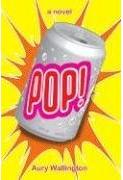 Did bookstore mega-chain Borders ban a young adult novel because the book implied sex was as good as soda pop?
Did bookstore mega-chain Borders ban a young adult novel because the book implied sex was as good as soda pop?
Borders’ recent decision not to stock the young adult novel “Pop!” has caused some puzzlement in the publishing industry. Though penned by a former “Sex in the City” writer, Aury Wallington, “Pop!”–published by Penguin’s Razorbill imprint–is not so different from many young adult novels: It features hot boys, a teenage girl who is ambivalent about what to do about them, and tons and tons of single-sentence paragraphs. Sex is amply represented in the novel–about a young woman’s quest to lose her virginity–but Wallington’s point, as she told one interviewer, is that “sex is going to have emotional consequences no matter how much you tell yourself that it’s not.” This is YA lit in the sex-ed-with-self-esteem mode invented by Judy Blume in her novel “Forever,” to which “Pop!” has been compared.
Why did Borders nix “Pop!”? The chain won’t say precisely, but there are some clues. For one, customers may special order it from their stores, meaning it was the display that made things dicey. And after giving The Book Standard a boilerplate answer about “making choices every day” about what to stock, the children’s buyer added, “Other factors in this decision include the format of the book, the price, the cover design, and the competitive landscape.” Since the format, price, and competitive landscape don’t distinguish “Pop!” the focus falls to the cover, which shows the title splashed across the front of a soda can.
Call it the Joe Camel Syndrome. Back in the ’90s, cigarette companies were excoriated for using cartoon characters to advertise their product, notably Camel’s hipster with the body of Ken doll and the head of a dromedary; ever since, any image that attracts the notice of children has raised hackles. In Marshall, Missouri, graphic novels with “themes” more innocuous than “Pop!” have nonetheless been banned from the local library because they look like comic books and might draw young readers.
Have young adult novels become too racy? Are young adults too sex-obsessed? Are the lessons of “Pop!” healthy for our teens? Don’t look for the answer here. We can say, however, that if you want to talk about sex in literature, label it like medicine.

